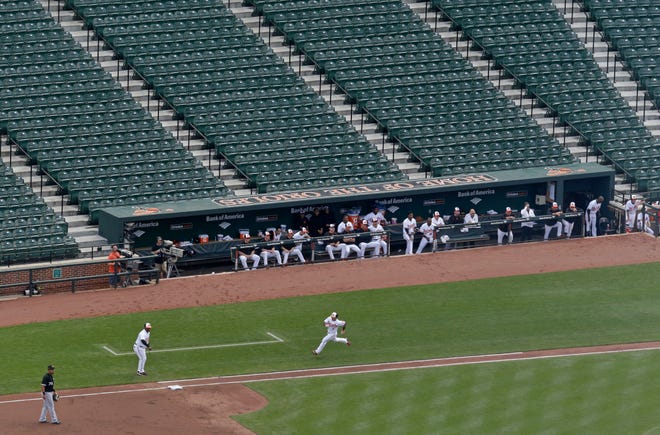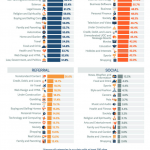The stands were empty and the stadium eerily quiet. There was no walk-up music. No in-game promotions. Players in one dugout could easily hear conversations in the other.
“You didn’t even have to call down to the bullpen,” former Baltimore Orioles manager Buck Showalter told USA TODAY Sports. “You could just yell.”
That 2015 game between the Orioles and Chicago White Sox was the first in MLB history to be played without fans in attendance, the result of unrest in the city following the death of an African American man, Freddie Gray, while in police custody.
Now, as the novel coronavirus continues to spread, the idea of holding sporting events without spectators in the United States has gone from far-flung hypothetical to legitimate possibility.
Multiple NBA team executives told USA TODAY Sports they have considered playing behind closed doors but only as a last-resort contingency plan. They requested anonymity because they were not authorized to speak publicly about the situation.
The NBA sent teams a memo Friday telling them to prepare for the possibility of playing games without fans and to identify essential personnel who would need to be in attendance for such games. The NBA also reminded teams that any decision to postpone or cancel games needs to come from the league office.
Staging games without fans is a step that sports leagues around the world have already taken in an attempt to slow the spread of COVID-19, which has now infected more than 93,000 people across 76 countries.
The Italian government on Wednesday mandated that all of the country’s sporting events, including Serie A soccer games, be held without fans. Switzerland’s national hockey league played in nearly empty arenas after Swiss authorities banned gatherings of more than 1,000 people. And the governing body for Japanese sumo wrestling recently moved a major spring tournament behind closed doors for the first time in the sport’s history.
In the U.S., where the spread of the virus has been more limited, college and professional sports leagues have largely been unaffected. Yet if the situation worsens, leagues would likely prefer to hold games without fans rather than cancel them, in part because of the significant financial implications involved.
The Centers for Disease Control and Prevention has provided guidance on how to manage mass gatherings. But on Thursday, one local health agency in California — the Santa Clara County Public Health Department — requested that organizers cancel large public events, including sporting events. One of the pro sports teams in the county, the NHL’s San Jose Sharks, acknowledged that recommendation but played its Thursday night game as scheduled.
“We will be evaluating further upcoming events in the coming days,” Sharks Sports & Entertainment said in a statement.
‘WE’RE NOT STOPPING LIFE’:Sharks fans attend game despite call for cancellation
The Golden State Warriors, playing in San Francisco’s Chase Center, said in a statement Friday that their Saturday game – broadcast nationally on ABC – “will continue as scheduled.” But the team advised fans who are feeling under the weather to not attend.
“Any guest who is feeling sick, regardless of their symptoms, should not attend public events. In addition, the Warriors are also encouraging vulnerable populations, including persons with underlying health conditions, not to attend tomorrow night’s Warriors game at Chase Center,” their statement read.
On the other side of the country, Johns Hopkins University announced Thursday that it will not allow fans to attend Division III tournament games being held at the school this weekend over fears of the coronavirus.
Public health officials, of course, hope that the notion of widespread crowd-free American sporting events remains purely hypothetical. As do players, many of whom have not even considered the possibility of playing multiple games in empty arenas.
“You always try to have home-court advantage. But to have no fans? That would be a crazy thing,” Philadelphia 76ers forward Glen Robinson III said. “I’m just praying on it and hoping this thing can slow down and get to an end.”
Financial, broadcasting layers
As of Thursday, the only significant American sports cancellations related to the coronavirus involved Chicago State University, a Division I school that canceled some of its men’s and women’s basketball games — including a road trip to the Seattle area, where the majority of American cases of coronavirus have been diagnosed.
Major sports organizations — including the NCAA, MLB, NBA and NHL — have taken more measured steps, asking athletes to avoid high-fives and forming panels to monitor coronavirus-related risks.
One advocacy group, however, has called for “a serious discussion” about not allowing fans to attend March Madness games this month.
The tournament, which begins March 17, will feature 67 games at 14 locations across the country. It is also the NCAA’s most important moneymaker. The 2018 iteration of the event generated $844.3 million in television and marketing rights alone, making the notion of canceling it altogether nearly unfathomable.
Holding the NCAA tournament behind closed doors, of course, would have broad financial implications as well — just like it would at all levels of sports, from NBA games to small professional tennis tournaments.
“There’s so many layers to this,” said David Carter, an associate professor of sports business at Southern California. “It’s just all these cascading effects.”
Carter and other experts in sports business and law said it’s difficult to grapple with the potential economic ramifications of American sports behind closed doors without knowing more specifics — namely which leagues or events would be impacted and for what period of time.
The absence of fans at the Masters, for example, would have a more significant impact on the local economy in Augusta, Georgia, than a few crowd-free NHL games in a middling market. And while media and sponsorship deals would generally be unaffected, a minor league baseball team in North Carolina might be more dependent upon ticket revenue than the New York Yankees — even if game-related costs also would decrease.
“You (wouldn’t) need ushers and ticket takers and concession stand operators and parking attendants,” Carter explained. “That’s a small, small, small number — but that’s also going to go into the appreciation of just exactly how costly this would be.”
When approached by USA TODAY Sports, coaches and executives in multiple leagues were reluctant to talk about potential issues related to coronavirus — financial, or otherwise.
One person familiar with his NBA team’s operations told USA TODAY Sports that the business side of his Eastern Conference team was taking a closer look at what games without fans would look like financially, noting that the impact could be noticeable. But the person cautioned that they are far from that point today, with just five weeks left in the regular season.
An NBA executive on a different team said that despite any lost revenue, playing games without fans would be better than canceling them altogether, which he said would create a scheduling nightmare.
Then there’s the broadcasting aspect to consider. Would crowd-free games sap the excitement of TV broadcasts or actually increase interest?
“You’ll attract potentially a greater audience, because there won’t be those fans that are typically in the seats,” said Irwin Kishner, the co-chair of the sports law group at Herrick, Feinstein who has negotiated multiple television and media rights deals. “And it certainly would attract people watching it, because it’d be something of a novelty.”
‘Peaceful, but just odd’
It’s unclear whether sports leagues would move games behind closed doors only after a request by public health officials or preemptively on their own accord.
Though measles outbreaks on separate occasions in 1985 and 1989 led to a handful of college basketball and hockey games being played in nearly empty venues, crowd-free sporting events in the U.S. have largely been the byproduct of weather or security concerns rather than matters of public health.
In 2008, for example, the Class AAA Iowa Cubs played a game without spectators after severe flooding in Des Moines. Four years later, golf fans were barred from attending the third round of the AT&T National in Bethesda, Maryland, after an overnight storm littered the course with fallen trees and limbs.
“It was peaceful,” Jim Furyk told The Associated Press after his round, “but just odd.”
Arguably the most memorable crowd-free game took place in Baltimore — an afternoon that its participants describe as weird but unforgettable.
San Francisco Giants pitcher Kevin Gausman, who pitched for the Orioles in that game, remembers realizing that it was the first time going back to T-ball that he’d never played in front of any fans. Players on the field could hear TV broadcasters calling the game and umpires chatting between outs.
“Definitely a once-in-a-lifetime experience,” said Giants teammate Jeff Samardzija, who started that game for the White Sox. “I honestly wouldn’t recommend it.”
After his experience in 2015, Samardzija said he would strongly recommend postponing games and rescheduling them, rather than playing in vacant, quiet stadiums.
“This is a game to be played in front of fans,” he said. “I understand a lot of people watch on TV nowadays, but it’s definitely a spectator sport.”
Other players and coaches agreed, with the hope that the mandates in Italy, Japan and Switzerland never come to pass in the U.S.
But they also understand the importance of being cautious.
“It’s a nice privilege to be able to play basketball, but I would like to be able to live many, many years past this,” Los Angeles Lakers guard Alex Caruso said. “If it is a legit thing that needs to be done, do whatever you have to do.”
[“source=usatoday”]






